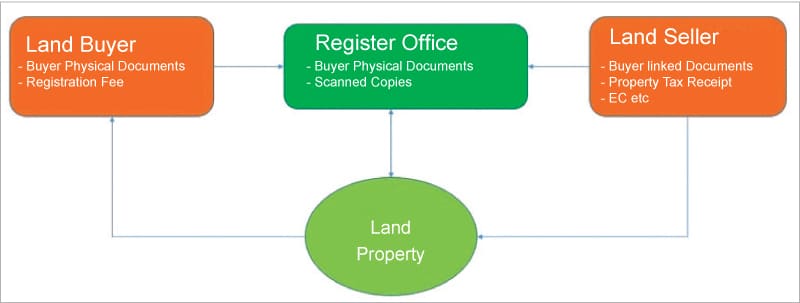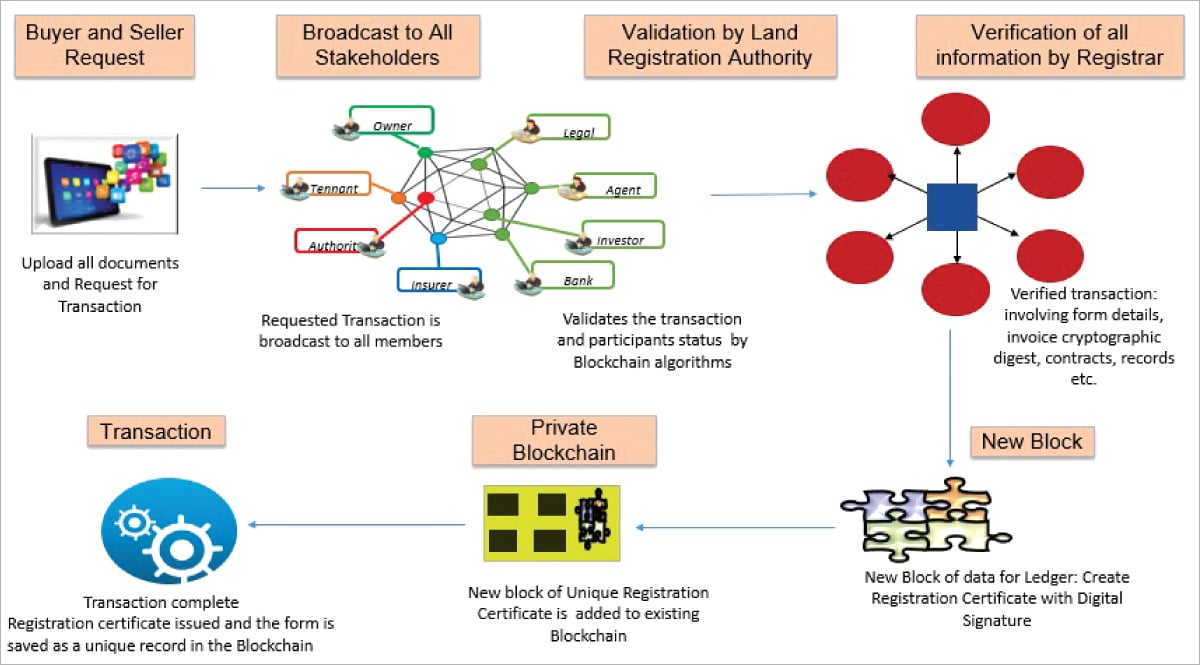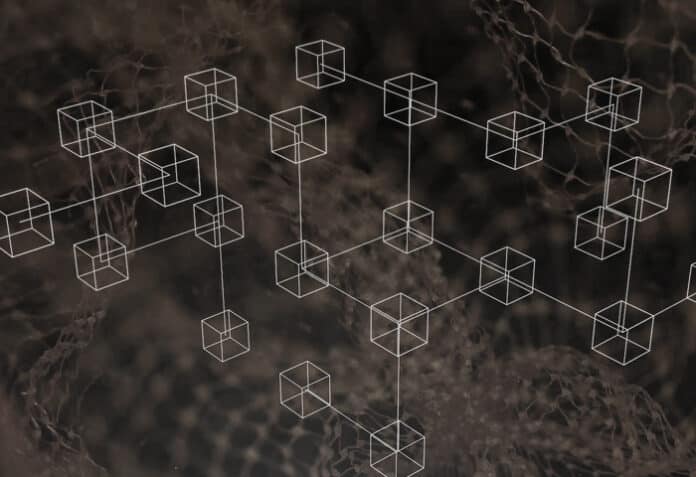Blockchain promises a transparent, secure, and efficient land management system, fostering trust and empowering citizens.
Blockchain is a digital, distributed and decentralised network to store information in a tamper-proof form, providing an automated way to enforce trust among different participants. An open distributed ledger can record all transactions between different parties efficiently and in a verifiable and permanent way. It captures, manipulates, and builds consensus among participants in the network.
Each block is uniquely connected to the previous blocks via a digital signature, which means that making a change to a record without disturbing the previous records in the chain is not possible, thus rendering the information tamper-proof.
Here, I propose a traceable method for registering personal information on the blockchain, giving individuals control over their information and ensuring it is only shared with authorised parties. This solution has the potential to improve privacy and security and give individuals the ability to track and monitor their personal information.
What governments around the world are doing
According to Forbes, the Republic of Georgia has declared that they would use blockchain technology to validate property-related government transactions. Countries like Sweden and the Honduras are also developing similar blockchain-based systems, for enabling secured e-governance.
Recently, Dubai announced that they would put all their records pertaining to land registry on the blockchain. Dubai Land Department (DLD) claims to be the first government department anywhere in the world to adopt blockchain for such high-level tasks.
According to the Times of India, 76 land grab cases were filed in the courts in the country since 2018 and 50% of these were in 2022 alone.
As per the SCC Online blog, the Supreme Court of India has observed that if a state government is so conscious or interested in taking action against land grabbers, it is the same government’s discretion to bring or better the appropriate legislation with the definition of ‘land grabber’, ‘land grabbing’ and ‘land grabbing cases’.
Andhra Pradesh has become the first state in India to pilot blockchain technology in two departments, and plans to deploy it across the administration.

Current state of the land management system
Land management entails the registration and management of all land deeds undertaken in any geographical location of a governing authority. Various government departments and local bodies maintain these records. The registration of land records does not authenticate the ‘land title’, which sometimes leads to title disputes and litigation.
The current land registration system in India involves a paper-based approach that is susceptible to fraud, errors, and security risks. The process is also time-consuming and involves huge documentation, which contributes to fraudulent activities.
One survey estimated that 70% of landowners are vulnerable to manipulation by individuals or mediators with stakes, who challenge the validity of their ownership. There are a huge number of examples across India where land has been grabbed by forging records.
Of late, there is an increase in complaints of irregularities and corruption in updating land records. Many Indians are eagerly waiting for corrections in their land records.
In today’s scenario, the seller and buyer meet at the registration office, share the physical documents in the presence of the Registrar, and complete the land registration. The transaction primarily happens through the exchange and verification of physical copies.
The major issues with land registration in India are:
- Unclear land titles, leading to huge GDP loss
- Land grabbing
- Duplicate land records
- Land records are maintained in silos; hence, updating and verifying the records is a challenge
- Poor record-keeping, with stakeholders often dealing with inaccurate data
- The database method used for storing data is inadequate in terms of data security
- Multiple land web portals, and none of them provide a single source of truth
All the above facts demand the government to develop a secured, tamper-proof, paperless, and long-lasting online solution to manage land registration and land records. The best solution for this is implementation of blockchain technology-based land management.
Blockchain-based land management solution for the future
Blockchain technology helps establish trust, transparency and accuracy in maintaining land records and building a robust land management system. Implementation of blockchain in land records provides:
- Integrity
- Transparency
- Elimination of intermediaries
- Speed
- Elimination of documentation work
- Minimisation of fraud
The blockchain-enabled land management system is a decentralised public ledger spread over a distributed network that records every transaction associated with a land property in an autonomous and efficient manner. It enhances the accuracy and security of land records.

Blockchain works by validating transactions through a distributed network to create a permanent, verified, and unalterable ledger of information. Figure 2 shows the end-to-end flow of the blockchain-based land registration process.
The steps followed in this process are:
- The seller requests that the invoice be published by the purchaser. Seller stores the relevant factoring agreement in a smart contract on a public blockchain.
- Purchaser examines the smart contract, notices that the invoice has been factored and pays the invoice amount.
- After obtaining the signature of the purchaser and seller in the sale deed, the scanned document is moved into the blockchain network to create a block.
- The certificates issued by the revenue department are stored in the blockchain and can be used by other agencies like the bank for any verification process during a land transaction.
- Verification of the details is done using the blockchain data. After the approval of transactions in the respective database, such as completion of registration or approval of a loan by the bank, the transaction details are stored in the blockchain.
Once the block is created, it cannot be tampered with or edited. The chain of blocks is created every time the property title is changed from one person to another.
Also, the existing history of transactions on a piece of land first needs to be inserted into the blockchain after approval by revenue functionaries in the state. The approved data can be digitally signed and stored.
Blockchain technology helps to set up:
Tamper-proof land records: Land records are secure, tamper-proof and immutable. This reduces the scope of forgery or manipulation.
Unified registration system: A single digital platform removes bureaucratic silos and helps in driving greater efficiency and reducing inaccuracies/forgeries.
Transparent registration process: Automating the process of registration using smart contracts does away with mediators who are vulnerable to corrupt practices.
Benefits of blockchain technology in land management system
One of the major benefits of using blockchain is the reduction in the cost of storing physical records of any land property. Other benefits are:
- Greater transparency, as transaction histories become more transparent using blockchain technology
- No need for trusted authorities like notaries to provide attested copies of documents
- Citizens are assured that their land ownership cannot be changed by spurious persons
- Enhanced security – blockchain is far more secure than other record-keeping systems
- Elimination of error-handling through real-time tracking of transactions with no double spending
- Improved traceability
- Trusted recordkeeping
- Purchaser need not depend on any unreliable personnel/agency to verify the authenticity of the document provided by the seller
- Increased efficiency and speed, reducing settlement time to mere seconds by removing intermediaries
- Reduced cost and complexity due to the elimination of expensive proprietary infrastructure
- Full automation of transactional processes, from payment through settlement
Blockchain-based government applications prevent illegal activities involved in land transactions. All contracts and ownership details are maintained in a decentralised way, eliminating the need for physical intervention. Data transactions can be tracked easily, which improves the overall security of the system.
Blockchain is a unique and universal technology that helps streamline and automate nearly all citizen services and legal contracts, while increasing the transparency and effectiveness of government services.
Acknowledgements: The author would like to thank Santosh Shinde of BTIS, Enterprise Architecture division of HCL Technologies Ltd for giving the required time and support in many ways in bringing this article as part of architecture practice efforts.
Disclaimer: The views expressed in this article are that of the author and HCL does not subscribe to the substance, veracity, or truthfulness of the said opinion.












































































